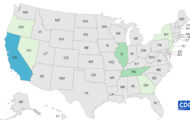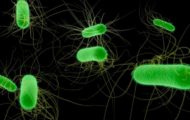Egg safety is important at all times of year, but at Easter it's really critical. Many eggs can carry Salmonella bacteria, and there have been quite a few outbreaks linked to shell eggs. Are they safe to eat? The USDA has some answers. Salmonella can not only be present on the eggshell, but inside the egg itself. If hens have bacteria in their ovaries, it will be inside the egg as it develops. Plus, the shell is porous, and bacteria can easily pass through the shell. So you need to be careful about handling them. Wash your hands thoroughly with soap and water before and after handling raw eggs. After the eggs are cooked, you can dye them. Never dye uncooked eggs. Make sure that the eggs are hard boiled first. And cook the eggs well done. To safely hard cook eggs, put the raw … [Read more...]
Keep Spring Holiday Meals Safe With Tips From the USDA
Keep spring holiday meals safe with tips from the USDA. This year, the three major holidays of Easter, Eid, and Passover are all happening in early spring. USDA Under Secretary for Food Safety Dr. Emilio Esteban said in a statement, "The holiday season is a special time to gather with friends and family and enjoy traditional meals, Whether you’re celebrating your Easter dinner with ham, Eid lunch with lamb, or Seder meal with brisket, remember to keep food safety at the forefront." Food safety is especially important when you have people with varied health statuses and ages at your spring holiday meals table, because some of those people are more susceptible to serious complications from food poisoning. In addition, some foods must be prepared early, which extends the time for … [Read more...]
Food Safety Tips For Passover and Easter
These food safety tips for Passover and Easter will help you celebrate while keeping everyone safe from food poisoning. Every time a group of people gather to eat, food safety rules are very important, especially if the group includes people at high risk for serious complications from foodborne illness. Of course, follow the rules of Clean, Separate, Cook, and Chill. Clean your kitchen before you start and wash your hands and utensils to avoid spreading pathogens. Separate by keeping raw meats, poultry, and eggs from foods that are eaten uncooked such as produce. Cook food to safe final internal temperatures and test with a food thermometer. Chill leftovers within two hours of taking food out of the oven or fridge; one hour if the air temperature is 90°F or higher. Eggs Eggs … [Read more...]
Tips for Easter Egg Hunt Safety From Fight Bac
Get tips for Easter egg hunt safety from Fight Bac. Remember that eggs are perishable foods just like meat and poultry, and should be cooked thoroughly and handled with care. Even clean, uncracked eggs can, and have been, contaminated with Salmonella and Listeria monocytogenes bacteria and have caused many illnesses. When you are coloring eggs for AEser, only use eggs that have been refrigerated, and discard any cracked or dry eggs. To cook eggs, place a single layer in a cause pan and add cold water to cover the eggs by one inch. Bring the water to a full rolling boil, then remove the pan from the heat and cover it. Let the eggs stand for 18 minutes for extra large, 15 minute for large, ant 12 minutes for medium. Then drain the eggs and immediately run cold water over them. You … [Read more...]
How Long Can You Store Easter Eggs After the Holiday?
Making and decorating hard cooked eggs for the Easter holiday is traditional. But how long can you store Easter eggs after the holiday? The answer is one week. Which means that this next Sunday, all of your hard cooked Easter eggs should be eaten or discarded. If you stored the eggs after peeling, they should be kept in a bowl of cold water. And change the water every day. Unfortunately, you can't freeze whole hard cooked eggs or they will be rubbery. You can remove and freeze the yolks if you want. Of course, that time frame assumes that you cooked the eggs to well done, refrigerated them within two hours of cooking, and stored them in a refrigerator at a temperature less than 40°F. And used food-grade dye to color the eggs. And that you didn't hide them directly on the ground … [Read more...]
Easter Food Safety Tips
Foodsafety.gov is offering tips to keep your Easter ham and eggs safe. Ham and eggs are traditional Easter foods in the United States. When you are cooking ham, make sure you know whether or not the product is fully cooked. Hams that are fully cooked are labeled so. Ham that is not ready to eat but looks like it's ready to eat will have a statement on the label that it needs cooking before you can consume it. Fresh, raw, ham, or ham that needs to be cooked first, must reach an internal temperature of 145°F, with a three minute rest time, before it is safe to eat. Make sure that you use a reliable and accurate food thermometer to test the meat. And ham and other meats should be cooked at an oven temperature no lower than 325°F. Cooked ham and cooked vacuum-packaged ham can be … [Read more...]
Easter Ham? Follow These USDA’s Food Safety Tips
If you’re serving ham for Easter, follows these food safety tips from the U.S. Department of Agriculture (USDA). There are many different kinds of ham and each has its own set of food safety rules. Is your ham fresh or cooked? Fresh ham is an uncured leg of pork. The word "fresh" usually appears on the label of a fresh ham to indicate that it has not been cured. These hams must be cooked to an internal temperature of 160 °F in an oven set no lower than 325 °F. Use a food thermometer to measure the temperature. After the ham is removed from the oven, let it stand for three minutes before carving. Cooked vacuum packed, canned hams and spiral cut cooked hams can be eaten cold, according to the USDA. If you’d like to warm them, heat the slices in oven until they reach a temperature of … [Read more...]
Spring Celebration Egg Food Safety Advice
The folks at FightBac.org are offering some tips for keeping your food safe during spring celebrations. Easter and Passover feature lots of eggs, which can be contaminated with Salmonella bacteria, especially Salmonella enteritidis. Clean hands are key. Always wash your hands with soap and warm water for 20 seconds before and after food handling. Be careful about cross-contamination. Always wash utensils, food contact surfaces, cooking equipment, blenders, cutting boards, etc. in hot water and soap between uses. Since bacteria grow in moist, protein-rich foods, always refrigerate eggs and foods made with egg. Make sure your refrigerator is set at 40°F or below, and always use a refrigerator thermometer to monitor the temperature. Remember the two hour rule: after two hours, … [Read more...]
At Easter, Keep Cats Away from Lilies, Dogs Away from Chocolate
We cover food safety for animals at Food Poisoning Bulletin. The FDA is concerned bout them too, so are issuing a warning for cat and dog lovers about things that are common for Easter celebrations. Make sure that all member of your family stay safe during the holidays and all other times. For humans, read our post about food safety and Easter eggs. Lilies, a common household plant, are very toxic to cats. (Tiger lilies, day lilies, and lily of the valley are toxic to dogs.) Make sure, if you choose to have any for your house, that your cat does not eat or touch any part of the plants. The entire plant, including leaf, pollen, and flower, is toxic. Do not buy these plants if you have cats. Symptoms of lily toxicity in cats include lethargy, vomiting, and loss of appetite. These … [Read more...]
Food Safety And Easter Eggs
Getting ready for Easter brunch or an Easter egg hunt? Here are some food safety tips from the U.S. Department of Agriculture (USDA) about eggs. Raw in-shell eggs can be kept in the refrigerator for three to five weeks. Never eat eggs that have an off smell when you crack them or eggs with whites that are pink or iridescent. Both are indications of spoilage. Raw eggs combined with other ingredients according to recipe directions, should be cooked immediately or refrigerated and cooked within 24 hours. Eggs should be cooked until their yolks are firm. Egg casseroles should be cooked to a minimum internal temperature of 160 °F as indicated by a food thermometer to be sure. Hard-boiled eggs can be kept in the refrigerator for up to one week. If you are dyeing, coloring or decorating … [Read more...]











